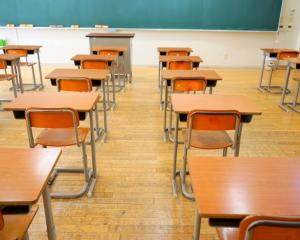Principals of Lakes District primary schools are concerned about the impact the Budget will have on staff funding and quality teaching.
Education Minister Hekia Parata said schools would have three years to meet the new class size ratios set out in the Budget announcement last month.
Schools nationwide would also take a large cut in specialist teaching, in areas such as arts and technology.
For Queenstown Primary School this would amount to a cut of 1.53 teaching positions in technology. Principal Lyn Bird said this would impact negatively on her staff, although it was too early to predict exact numbers.
"I believe the new policy will impact negatively on our education system, threatening our high-quality education programmes," she said.
Mrs Bird also feared that larger class sizes and the introduction of a "low-trust" teacher appraisal system would not encourage quality people into education.
"Removing specialists teaching in areas such as arts and technology sits in stark contrast to the Government's focus on science and innovation," she said.
Arrowtown Primary, one of the biggest schools in the area, could lose 1.25 teaching positions as early as next year, principal Robin Harris said.
"It is quite significant and worrying".
The board already funds some of the 26 full-time teachers at the school, but Mr Harris said the Budget would not allow the school to keep all its teachers when the changes came into play.
"We are probably talking 80-odd thousand [dollars] we stand to lose between this year and next year."
Under the new ratios, the Government will fund teachers at a rate of one for every 15 pupils in year 1, one to every 27.5 pupils from years 2 to 10, and one to every 17.3 pupils in years 11 to 13.
"The latest Budget has been extremely disappointing for teachers and educationalists," Kingsview Primary School principal Rebekah Key said.
"After speaking with a wide range of people ... I have not yet heard from a single person who thinks that the increase in class sizes is a good idea. Given the needs [of] children in our country, it would appear to me to be an unbelievable time to consider increasing class sizes, let alone actioning this."
St Joseph's Primary School will form a working party to evaluate the impact of the cuts, while Remarkables Primary School may lose up to three teaching staff and the year 7 and 8 technology component.
However, last week Ms Parata said schools would lose no more than two teachers.
MP and deputy prime minister Bill English, responding to the concerns yesterday, said there would not be a "particularly large effect" on Queenstown and Arrowtown schools.
He said the Government was "shifting its education targets" for 2016 to raise achievement levels by improving "teaching quality".
"The fact that teacher numbers have increased by 6000 over the past decade, while student achievement has not matched this, strongly supports our approach of focusing on quality teaching rather than continuing to increase teacher numbers.
"To help pay for this investment in teaching quality, we're making small adjustments in other areas."
He expected 90% of schools would gain funding for a teacher or have a net loss of less than one full-time teaching equivalent.
Remarkables principal Debbie Dickson said reducing staff numbers would affect the individualised programme approach teachers were providing.
She said education figures included "non-teaching leadership positions", such as her own and the deputy principal and so the actual number of children in a classroom would be about three more than the number stated in the Government's formula.
Mrs Dickson said class sizes would become "unacceptably large" if the ministry added the suggested 4.5 pupils to classrooms at some levels.











